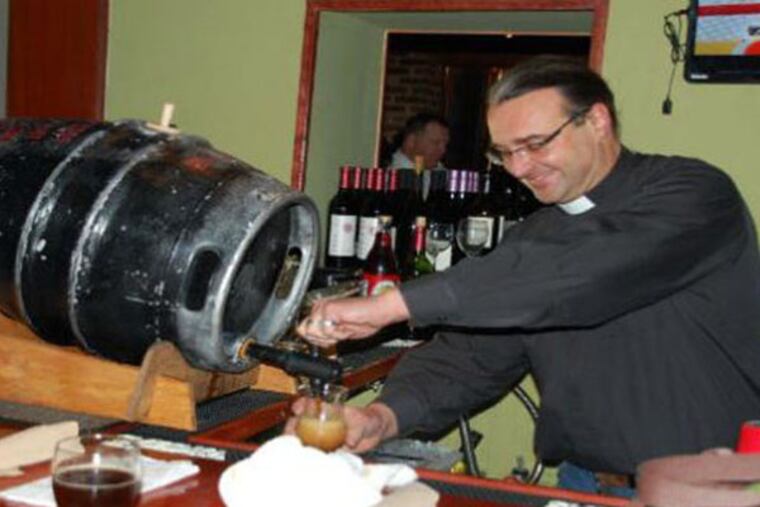Make merry with these festive, Joe Sixpack-approved holiday brews
WITH NO FANFARE or explanation, Goose Island Brewing this year changed the name of its winter seasonal beer from Christmas Ale to Festivity Ale.

WITH NO FANFARE or explanation, Goose Island Brewing this year changed the name of its winter seasonal beer from Christmas Ale to Festivity Ale.
I suppose if I were Bill O'Reilly, I'd go into a spittle-spraying rage over yet another breach in the so-called "War on Christmas." The pagan in me, however, will instead point out that removing Christ's name from the beer is not altogether misguided. That's because Christmas beer is actually older than Christmas itself.
Way older. At least 3,000 years before the Nativity, brewers - mainly farmers - were likely making special beer each winter.
But instead of the birth of the savior, these neolithic brews celebrated the rebirth of god - namely, the sun - on the occasion of the winter solstice.
For early man, the sun was everything, the giver of warmth and light and life itself. Whether it was Utu, the Mesopotamian sun god, or Ra of Egypt's Fifth Dynasty, or countless other solar deities, ancient civilizations observed their god's progress across the horizon and celebrated his reemergence on the darkest day of the year.
Beer, whose mind-altering alcoholic properties were (and maybe still are) welcomed as a mysterious, spiritual gift from god, certainly would've flowed.
Indeed, most records of solstice celebrations indicate a good deal of drunken behavior: public nudity, overeating, slaves and owners reversing roles, the appointment of fake kings, fighting dwarfs, dice games, forced vomiting.
You know, like Wing Bowl.
It's impossible to say exactly what kind of beer (or wine) filled the ancients' solstice vessels. Chemical analysis by Penn archaeologist Patrick McGovern of drinking cups pulled from a 5,000-year-old Egyptian tomb has turned up of evidence of unusual ingredients, including thyme and pine resin - just like some of today's holiday beers.
Since they were toasting god, we can also guess that, like many of today's winter holiday ales, it was strong.
Certainly that was the case in Norway, where the ancient winter feast of Jul (or Yule) honored Odin with ample cups of farmhouse ol (or beer). Under law, this juleol, as it is still known, had to be made with as much grain as the combined weight of the farm's husband and wife. A weak beer meant public shame and possible expulsion from the country.
These solstice celebrations faded and mostly disappeared in 350 A.D., when Pope Julius I established that Christ's birth was on Dec. 25.
Was the choice of the date divine, as believers insist? Or was it, as some historians say, a calculated ploy to usurp the pagans' solstice festivals?
It doesn't really matter, for the impact on civilization was the same. Traditions surrounding the solstice festivals - gift giving, the yule log, feasting and, yes, beer drinking - became part of the celebration of Christmas.
So, call it Christmas beer - or solstice lager or Saturnalia suds or festivity ale. It's all the same: a special beer made for the ages.
Here are six brews that are jingling my bells this season:
* Stoudt's Belsnickel (Adamstown): A dark, very malty, full-bodied Schwarzbier with a firm fruit flavor (plum, raisin) and a light, spicy finish. Named after Santa's Pennsylvania Dutch alter ego.
* Barren Hill Gingerbread Jesus (Lafayette Hill): This ginger-and-molasses Belgian dubbel was spawned by a Joe Sixpack holiday party, at which Roxborough's homebrewing reverend, Kirk Berlenbach of St. Timothy's Episcopal, shared a stash of traditional German Christmas cookies. The treats appeared to be made with communion wafers and, well, Gingerbread Jesus was born.
* Samuel Adams Merry Maker Gingerbread Stout (Boston): Ginger gives this stout its snap, a nice complement to its sweet, full-bodied malt base.
* Ommegang Adoration (Cooperstown, N.Y.): A classic strong, dark, Belgian-style ale spiced with coriander, mace, cardamom, grains of paradise and orange peel. With its label's depiction of the three kings, this malty ale is worthy as the Gift of the Magi.
* Scaldis Noel (Belgium): If there were ever a 12-percent-alcohol "session" beer, this would be it. With hints of marzipan and peach, this effervescent ale is both light-bodied and easy to drink.
* Spring House The Martians Kidnap Santa! (Conestoga): This egg nog stout takes its name from the classic bomb, "Santa Claus Conquers the Martians," a holiday matinee that I remember seeing 50 years ago at the old Brookline Theater in Havertown.
It's rich, creamy and makes a nice companion to the brewery's other Christmas treat, the cherry-flavored Two Front Teeth Holiday Ale saison.